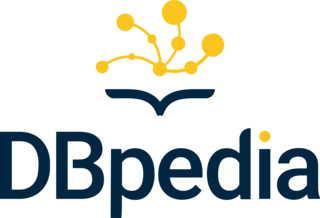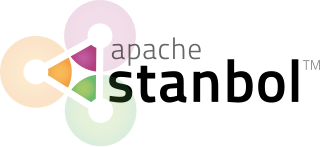
The Semantic Web, sometimes known as Web 3.0, is an extension of the World Wide Web through standards set by the World Wide Web Consortium (W3C). The goal of the Semantic Web is to make Internet data machine-readable.

Apache Flex, formerly Adobe Flex, is a software development kit (SDK) for the development and deployment of cross-platform rich web applications based on the Adobe Flash platform. Initially developed by Macromedia and then acquired by Adobe Systems, Adobe donated Flex to the Apache Software Foundation in 2011 and it was promoted to a top-level project in December 2012.
A semantic wiki is a wiki that has an underlying model of the knowledge described in its pages. Regular, or syntactic, wikis have structured text and untyped hyperlinks. Semantic wikis, on the other hand, provide the ability to capture or identify information about the data within pages, and the relationships between pages, in ways that can be queried or exported like a database through semantic queries.

Semantic MediaWiki (SMW) is an extension to MediaWiki that allows for annotating semantic data within wiki pages, thus turning a wiki that incorporates the extension into a semantic wiki. Data that has been encoded can be used in semantic searches, used for aggregation of pages, displayed in formats like maps, calendars and graphs, and exported to the outside world via formats like RDF and CSV.
An RDF query language is a computer language, specifically a query language for databases, able to retrieve and manipulate data stored in Resource Description Framework (RDF) format.
Semantic publishing on the Web, or semantic web publishing, refers to publishing information on the web as documents accompanied by semantic markup. Semantic publication provides a way for computers to understand the structure and even the meaning of the published information, making information search and data integration more efficient.

Apache Jena is an open source Semantic Web framework for Java. It provides an API to extract data from and write to RDF graphs. The graphs are represented as an abstract "model". A model can be sourced with data from files, databases, URLs or a combination of these. A model can also be queried through SPARQL 1.1.

Solr is an open-source enterprise-search platform, written in Java. Its major features include full-text search, hit highlighting, faceted search, real-time indexing, dynamic clustering, database integration, NoSQL features and rich document handling. Providing distributed search and index replication, Solr is designed for scalability and fault tolerance. Solr is widely used for enterprise search and analytics use cases and has an active development community and regular releases.

DBpedia is a project aiming to extract structured content from the information created in the Wikipedia project. This structured information is made available on the World Wide Web. DBpedia allows users to semantically query relationships and properties of Wikipedia resources, including links to other related datasets.
A semantic reasoner, reasoning engine, rules engine, or simply a reasoner, is a piece of software able to infer logical consequences from a set of asserted facts or axioms. The notion of a semantic reasoner generalizes that of an inference engine, by providing a richer set of mechanisms to work with. The inference rules are commonly specified by means of an ontology language, and often a description logic language. Many reasoners use first-order predicate logic to perform reasoning; inference commonly proceeds by forward chaining and backward chaining. There are also examples of probabilistic reasoners, including non-axiomatic reasoning systems, and probabilistic logic networks.
Freebase was a large collaborative knowledge base consisting of data composed mainly by its community members. It was an online collection of structured data harvested from many sources, including individual, user-submitted wiki contributions. Freebase aimed to create a global resource that allowed people to access common information more effectively. It was developed by the American software company Metaweb and run publicly beginning in March 2007. Metaweb was acquired by Google in a private sale announced on 16 July 2010. Google's Knowledge Graph is powered in part by Freebase.

Salzburg Research Forschungsgesellschaft mbH is an independent research and technology organisation (RTO), located in Salzburg, Austria. The organisation specializes in applied research and development in the field of information and communications technologies (ICT).
GeoSPARQL is a standard for representation and querying of geospatial linked data for the Semantic Web from the Open Geospatial Consortium (OGC). The definition of a small ontology based on well-understood OGC standards is intended to provide a standardized exchange basis for geospatial RDF data which can support both qualitative and quantitative spatial reasoning and querying with the SPARQL database query language.

Apache Stanbol is an open source modular software stack and reusable set of components for semantic content management. Apache Stanbol components are meant to be accessed over RESTful interfaces to provide semantic services for content management. Thus, one application is to extend traditional content management systems with semantic services.

Sebastian Schaffert is a software engineer and researcher. He was born in Trostberg, Bavaria, Germany on March 18, 1976 and obtained his doctorate in 2004.
Linked Data Platform (LDP) is a linked data specification defining a set of integration patterns for building RESTful HTTP services that are capable of read/write of RDF data.
The Open Semantic Framework (OSF) is an integrated software stack using semantic technologies for knowledge management. It has a layered architecture that combines existing open source software with additional open source components developed specifically to provide a complete Web application framework. OSF is made available under the Apache 2 license.
In natural language processing, linguistics, and neighboring fields, Linguistic Linked Open Data (LLOD) describes a method and an interdisciplinary community concerned with creating, sharing, and (re-)using language resources in accordance with Linked Data principles. The Linguistic Linked Open Data Cloud was conceived and is being maintained by the Open Linguistics Working Group (OWLG) of the Open Knowledge Foundation, but has been a point of focal activity for several W3C community groups, research projects, and infrastructure efforts since then.
Linked Data Notifications (LDN) is a W3C Recommendation that describes a communications protocol based on HTTP, URI, and RDF on how servers (receivers) can receive messages pushed to them by applications (senders), as well as how other applications (consumers) may retrieve those messages. Any web resource can advertise a receiving endpoint (inbox) for notification messages. Messages are expressed in RDF, and can contain arbitrary data.









